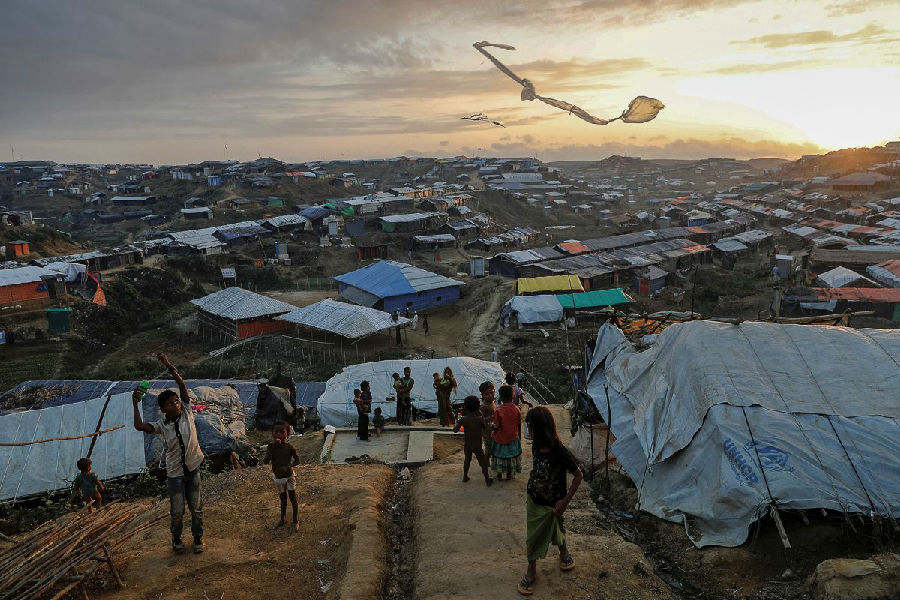5. Bangladesh, $2,085
5. 孟加拉國,人均國民收入2085美元
Bangladesh is a country of contradiction.
孟加拉國是一個充滿矛盾的國家。
Despite being among the largest producers of Rice and Tea in the world
盡管是世界大米和茶葉的生產大國,
and one of the largest banking sectors in South East Asia,
也是東南亞最大的銀行業之一,
the average income of its citizens is among the lowest in the world.
但是人均國民收入卻是世界最低的幾個國家之一。
This can partly be attributed to the past 40 years which have seen all manner of small scale,
這部分可能是因為這個國家過去四十年里都是各式各樣小規模,
but economically debilitating rebellions.
但是會削弱經濟的叛亂。

This is particularly ironic, as Bangladesh is the single biggest contributor to United Nations peacekeeping forces
諷刺的是,孟加拉國是聯合國維和部隊最大的組成部分,
and as of 2015 was rated as the most peaceful nation in Southeast Asia.
并且在2015年被評為東南亞最和平的國家。
4. North Korea, $1,800
4. 朝鮮,人均國民收入1800美元
This "Hermit Kingdom” is often seen as the poster child for poverty.
這個“隱士王國”經常被認為是貧窮的典范。
With the average citizen making less than $15 a week through normal economic channels,
正常經濟渠道下的人均周收入少于15美元,
the black or grey markets are the primary sources of income for most.
對于大多數人來說,黑市和灰市是主要的收入來源。
This of course means that a vast number of citizens are subject to inconsistent paychecks as a result of government crackdowns
這當然意味著在政府的鎮壓下大量公民的工資與收入不一致,
and the inevitable need to pay bribes to continue to exist.
同時為了生存下去,賄賂也是無可避免的。
In defense of North Korea, they at least nominally have a public food distribution system
為了保衛朝鮮,他們至少名義上有一個公共食品分配系統,
that reportedly sustains 70% of the country when famines aren't present.
據報道這個系統在沒鬧饑荒的前提下能維持全國70%的人生存。
While exceedingly poor at present, it is thought that there is an abundance of metal resources.
盡管目前極其貧困,但人們認為朝鮮有豐富的金屬資源。
With adequate infrastructure, it is estimated the value of these metals could be between $4 trillion to $6 trillion.
基礎設施足夠的話,這些金屬的預估價值可能在四萬億到六萬億之間。
3. Myanmar, $1,777
3. 緬甸,人均國民收入1777美元
Myanmar has not had what anyone could call an easy past.
緬甸沒有人們稱之為“輕松的過去”,
Almost 200 years of occupation, war and civil unrest has followed this country (also called Burma) into the modern age,
被占領200年后,戰爭和國內騷亂也一直持續到這個國家(“Burma”是緬甸的別稱)的現代時期,
along with a large list of human rights violations.
伴隨著大量侵犯人權的行為。
Among these are common reports of forced child labor, human trafficking and genocidal acts by the government.
這些行為包括強迫童工勞動,販賣人口以及政府實施的種族滅絕行為。
It comes as no surprise that this has greatly hindered the number of educated workers within the country.
這無疑會大大影響該國受教育工人的數量。
The economy likewise has been rough. Since the banning of Opium Poppies, many farmers have had no cash crop,
經濟也同樣不景氣。自從明令禁止種植罌粟,許多農民失去了經濟作物,
and the economy relies primarily on the exporting natural gas to neighboring countries.
經濟主要依賴向鄰國出口天然氣。
2. Nepal, $1,500
2. 尼泊爾,人均國民收入1500美元
Even before the earthquake disaster of 2015,
即使在2015年地震災難之前,
Nepal was already a place where health as well as poverty were major concerns.
尼泊爾就已經是一個主要關注健康和貧困的國家。
Over 40% of the population lives off less than $2 a day,
超過40%的人口每天生活費不足2美元,
and nearly one third of homes are without modern sanitation (such as toilets).
近三分之一的家庭沒有現代衛生設備(例如廁所),
70% find employment in the agricultural sector,
70%的人務農,
while garment industries and tourism make up a significant portion of the rest of the workforce.
盡管從事服裝業和旅游業的勞動力占剩余勞動力的很大一部分。
1. Afghanistan, $1,100
1. 阿富汗,人均國民收入1100美元
After suffering decades of being a war-torn nation, it should come as no surprise that Afghanistan heads this list.
在經受長達十幾年的戰爭蹂躪之后,阿富汗這個國家入選這個名單也就不足為怪了。
Like many on this list, a majority of Afghanistan's economy is based on agriculture,
就像這個名單上的許多國家,阿富汗的大部分經濟也是基于農業,
even though only 6% of the nations land has proven usable.
即使阿富汗只有6%的土地被證明能耕作。
While animal husbandry used to also be a major economic factor,
畜牧業曾是一個主要經濟因素,
up to 80% of domestically useful species were wiped out by incursions of Iranian and Pakistani refugees in the early 2000's.
21世紀初,伊朗和巴基斯坦難民的入侵使國內多達80%的有用物種被消滅了。
The future continues to look uncertain for this country,
阿富汗的未來也充滿了不確定性,
as the entire region is engaged yet again with a large terrorist threat that is sure to hinder growth and development.
因為整個地區再次面臨巨大的恐怖主義威脅,這必將阻礙經濟的增長和發展。











